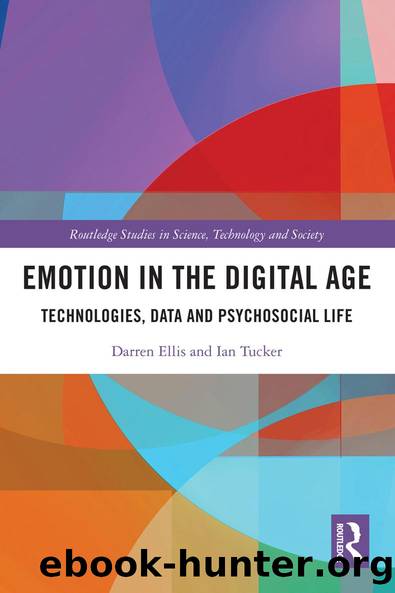Emotion in the Digital Age by Darren Ellis Ian Tucker

Author:Darren Ellis, Ian Tucker [Darren Ellis, Ian Tucker]
Language: eng
Format: epub
Tags: Fiction, Psychological, Psychology, Emotions, Social Science, General, Sociology, Marriage & Family
ISBN: 9781351609715
Google: FQ_2DwAAQBAJ
Publisher: Routledge
Published: 2020-10-08T05:16:44+00:00
Plundering personalities
A prime example relating to emotional manipulation was the Facebook emotion experiment conducted on 689,000 Facebook users by Cornell University and the University of San Francisco, where newsfeeds were manipulated in attempts to control the emotions that users were exposed to (Kramer et al., 2014). This study had significant ethical problems (e.g. lack of consent) but has been used as evidence for the power of social media to manipulate thoughts, feelings, and emotion. No doubt, this had some impact upon Cambridge Analyticaâs more recent use of social media manipulation, whereby 50 million Facebook usersâ personal information was captured without consent of either Facebook or the users. This data was targeted with the intention of manipulating voter behaviour. Most notably, the Analytica manipulation was linked to Donald Trumpâs US Presidential election campaign and the Brexit campaign in the UK. Analytica developed software to predict and emotionally influence ballot box choices, otherwise known as psychographic microtargeting. The whistle blower Christopher Wiley stated:
We exploited Facebook to harvest millions of peopleâs profiles. And built models to exploit what we knew about them and target their inner demons. That was the basis the entire company was built on.
(Graham-Harrison & Cadwalladr, 2018)
Through developing a personality detection algorithm, they were able to detect a votersâ orientation and craft messages aimed at nudging them towards a Trump or Brexit vote. Up until 2012, Facebook users were invited to take a psychometric test called myPersonality, an app developed by David Stillwell in 2007 at The Psychometrics Centre at Cambridge Judge Business School. Six million people took the test, and their data were shared with registered academic collaborators. According to Kanter and Kanter (2018), this led to 45 scientific publications. In 2008, Michael Konsinki joined Stillwell, and they claimed they were able to predict usersâ personalities. The theory of personality that it drew on was the five-factor model, which is supposed to measure a personâs amount of: Openness to experience, conscientiousness, extraversion, agreeableness, and neuroticism (OCEAN). After the test, users could opt in to share their Facebook data with the researchers. Personality outcomes were then correlated with their Facebook likes. For example, people who liked Lady Gaga were most likely to be extraverts, and those who liked philosophy were most likely to be introverts. The suggestion is that the more data-points that can be harvested, the more reliable and powerful the predictions become. It was famously stated that with 150 Facebook likes, the system could predict a userâs personality better than an individualsâ friends could, and with 300 likes, it could outperform a spouse! (Youyou et al., 2015). Cambridge Analytica (as subsidiary of Strategic Communication Limited Group [SGL]) was partly owned by an American hedge fund billionaire, Robert Mercer. A data scientist, Christopher Wylie, went to work for Alexander Nix at SGL and introduced Wylie to Steve Bannon, who was the head of Donald Trumpâs 2016 US Presidential election campaign. Between them, they decided to combine microtargeting (a well-used political tool to target voters) with harvesting votersâ personality information.
Download
This site does not store any files on its server. We only index and link to content provided by other sites. Please contact the content providers to delete copyright contents if any and email us, we'll remove relevant links or contents immediately.
Nudge - Improving Decisions about Health, Wealth, and Happiness by Thaler Sunstein(7709)
The Fire Next Time by James Baldwin(5449)
iGen by Jean M. Twenge(5417)
Adulting by Kelly Williams Brown(4576)
The Sports Rules Book by Human Kinetics(4389)
The Hacking of the American Mind by Robert H. Lustig(4384)
The Ethical Slut by Janet W. Hardy(4258)
Captivate by Vanessa Van Edwards(3841)
Mummy Knew by Lisa James(3693)
In a Sunburned Country by Bill Bryson(3544)
The Worm at the Core by Sheldon Solomon(3487)
Ants Among Elephants by Sujatha Gidla(3467)
The 48 laws of power by Robert Greene & Joost Elffers(3293)
Suicide: A Study in Sociology by Emile Durkheim(3024)
The Slow Fix: Solve Problems, Work Smarter, and Live Better In a World Addicted to Speed by Carl Honore(3010)
The Tipping Point by Malcolm Gladwell(2927)
Humans of New York by Brandon Stanton(2873)
Get What's Yours for Medicare: Maximize Your Coverage, Minimize Your Costs by Philip Moeller(2745)
Handbook of Forensic Sociology and Psychology by Stephen J. Morewitz & Mark L. Goldstein(2705)
